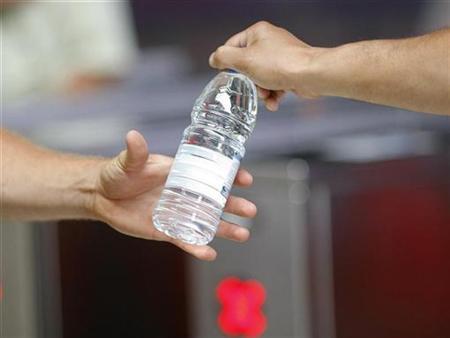Date: 10-Jul-09
Country: US
Author: Maggie Fox, Health and Science Editor
What's In That Bottle? Congress Says Water Unclear Photo: Tim Wimborne

A man hands a bottle of water to another man in Sydney,
February 6, 2009.
Photo: Tim Wimborne
WASHINGTON - Bottled water makers make millions off people who believe their
products are purer than tap water, but consumers do not realize that they
are less regulated than plain old tap water, according to a U.S.
Congressional report released on Wednesday.
The report from the General Accountability Office also found that the U.S.
Food and Drug Administration has little power to regulate the safety of
bottled water, and even states with the power to regulate it concentrate
more on tap water.
The report was just one piece of ammunition unleashed at the bottled water
industry at a hearing of the House of Representatives Energy and Commerce
Subcommittee on Oversight and Investigations.
"Of particular note, FDA does not have the specific statutory authority to
require bottlers to use certified laboratories for water quality tests or to
report test results, even if violations of the standards are found," the GAO
report reads.
Jane Houlihan of the Environmental Working Group, an advocacy organization
that submitted a second report to the committee, said in a statement: "Many
people assume bottled water is healthier and safer to drink than ordinary
tap water.
"But some companies have lured consumers away from the tap with claims of
health and purity that aren't backed by public data."
Sponsors of the hearing agreed.
"Americans are willing to pay top dollar for bottled water, which costs up
to 1,900 times more than tap water and uses up to 2,000 times more energy to
produce and deliver," Michigan Representative Bart Stupak told the hearing.
CONTAMINATION
"Over the past several years, however, bottled water has been recalled due
to contamination by arsenic, bromate, cleaning compounds, mold, and
bacteria. In April, a dozen students at a California junior high school
reportedly were sickened after drinking bottled water from a vending
machine."
Joseph Doss, president and chief executive officer of the International
Bottled Water Association, told the hearing that Americans drank 8.7 billion
gallons (33 billion liters) of water in 2008, or 28.5 gallons (108 liters)
per person.
"Sales revenues for the United States bottled water market in 2008 were
approximately $11.2 billion," Doss said. "Bottled water consumption is about
half that of carbonated soft drinks and only slightly ahead of milk and
beer.
The GAO found that the FDA does not regulate a compound called DEHP in
bottled water. The Environmental Protection Agency regulated levels of DEHP,
a so-called phthalate linked to some health risks, in tap water.
"Specifically, FDA deferred action on DEHP in a final rule published in 1996
and has yet to either adopt a standard or publish a reason for not doing so
on the safety of bottled water," the GAO said.
Doss said DEHP was unlikely to be in bottled water, which he said was
governed by several layers of regulation.
Stupak pointed out some of the claims by bottled water makers.
"Aquamantra uses the design on its labels to affect the molecular structure
of California natural spring water to make it more refreshing and wholesome
to drink," one company's website claims.
Poland Springs water talks about a polio victim who lived 52 years more
after drinking water from its spring.
(Editing by Mohammad Zargham)
© Thomson Reuters 2009 All rights reserved
